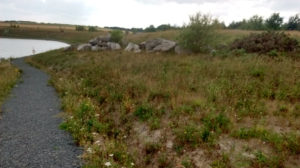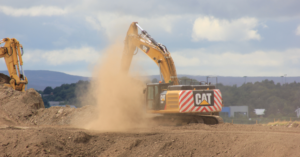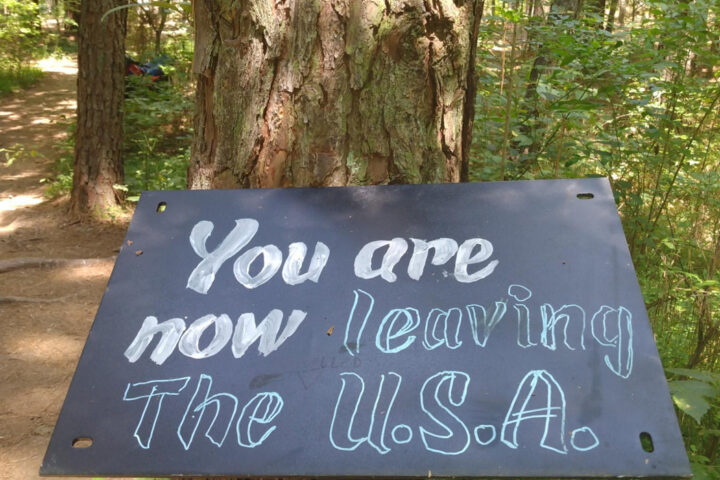Banks Group want to remove 800,000 tonnes of coal and 400,000 tonnes of fireclay from 112 hectares at Dewley Hill, which sits to the North of the A69 near Throckley, on the Newcastle/ Northumberland border.
Recently signs have been erected in the area which saying comments can be made on the application until the 30th July. If you haven’t already made an objection to the opencast we encourage you to do so. Newcastle Council has confirmed that all representations that have already been made will be considered, even though they are temporarily not on the council website.
Local campaign group, Defend Dewley Hill is working against this application.
How you can help
Do you object to this proposal? The council counts every letter which comes relating to the application, anyone can object. Unique letters count more than ones which are copied. Feel free to write your own reasons against the application, some of our objections to the site are listed below.
If you wish to object, please email the councils at dewleyhill@newcastle.gov.uk include the reference number in the subject line 2019/0300/01/DET for Newcastle or 19/00799/CCMEIA for Northumberland (road points only) and give a name and address/ post code. If you copy in defenddewleyhill @ gmail.com (without the spaces) as we are also counting the submissions. Alternatively you can search for the application number at each council and then register and submit comments online.
There have been previous applications for this area dating back to 1992 and 1996 both were rejected, the second was rejected again on appeal.
Reasons you may want to include to object:
Local reasons against Dewley Hill opencast
- The proposal sits on over 250 acres of Newcastle’s green belt land, which should be protected from development.
- Opencast coal mining destroys everything that lies over the coal seem. This means the waterways, mature trees, hedgerows, wildlife, top soil, public rights of way are all stripped away.
- Opencast coal mines are incredibly disruptive to local people. If this opencast went ahead it would increase traffic on the roads, including heavy goods vehicles on the A69. The sites are brightly lit, which is particularly irritating in rural areas in winter to humans and to bats all year round. The machines are noisy, often in an irregular, irritating way. Opencast mining throws up dust, which includes all of the toxins located in the coal.
- Northumberland Wildlife Trust remains concerned about the impact on farmland birds such as skylark, lapwing and yellowhammer during the active stage of the proposed mine. Hedgerow removal would interrupt animals’ movement through the area.
- The site lies in the catchment area of the Dewley and Ouse burns. Coal mine dust is toxic as it contains mercury, silica, cadmium, arsenic and the air pollutants which killed underground miners.
- This application would involve work on the site for 3.5 years. Banks Group may well submit further plans for extensions. Previous applications included coal removal from the east and the west of this proposal, so there is clearly more coal adjacent.
- The fireclay that could be extracted is not needed and should not be considered as a benefit. Ibstock Brick are a partner in this application. However the council has “confirmed that there is a sufficient landbank of 27 years’ permitted reserves for brick clay from Red Barns Quarry in South Tyneside” according to the Development and Allocation Plan report.
- How Banks Group intend on putting back the site can only be a degradation on what currently exists or could be created on the site without coal extraction. So called ‘restoration’ cannot put back what was there and the soil structures that biodiversity rely on would be diminished. None of the proposed benefits of restoration need rely on the area being opencast first. Bank Group’s Pegswood leaky lake is still an eye sore well over a decade since coal extraction finished. The companies high claims for ‘restoration’ should be ignored.

Banks’ Pegswood leaky, stony lake
- The Northumberland Wildlife Trust severed ties with Banks Group in May 2019. The Trust’s chief executive, told the Chronicle: “The reason we are [severing ties] is we are now looking to underline the fact that we do not approve of [Banks Group’s] constant applications and proposals for opencast coal extraction…We are totally against coal extraction as a trust”.
- The proposal is smaller than previous ones on the same site, but the impacts would still be significant for local people and the environment.
- The proposal threatens jobs in the area and reduces the farm land available for food production. If approved the opencast would be very visible and give a poor impression to tourists in our area who may be less inclined to return.
- Banks Group won’t be providing new jobs as experienced staff will be moved from nearby opencast operations which have closed. There is no future in coal mining.
- Residents at Bank’s Bradley site in the Pont Valley Durham reported issues with light pollution, noise, water run offs, inappropriate use of blasting flags, and aggressive security guards. The same issues are likely here if the application were to be approved.
- Air pollution from the A69 is already a problem, an opencast coal mine in the area would worsen this issue.
- The company proposed an additional 302 vehicle movements a day to the site entering via Ponteland road, the B6323, everyday. Banks propose a simple T-junction which could cause congestion and be intimidating for vulnerable road users such as cyclists.
- The £50,000 offered in total to community groups is a bribe to accept something which is not acceptable. Clean air and wide open spaces are worth more than this.
National and international reasons this must be rejected
- The coal at the site is thermal coal, it is mainly used in power stations, but can be used in some industrial processes. Coal power stations are to be phased-out by 2024 and we have large stockpiles of this type of coal.
- Coal, wherever it is consumed causes climate change. Power stations have to close by 2024 because of the emissions from burning coal. The single largest emitter of carbon dioxide in the UK is Tata Steel’s Port Talbot Steel works, the second is British Steel’s Scunthorpe steel works. If Banks sold the coal to industry, it would still be contributing to climate change which affects those who least caused it the most.
- We have alternatives to this coal already in use. We can power electricity generation without coal, there are alternatives ways to make steel including by recycling, that use other fuels. Cement can be made without coal, alternatives have been around long enough to be adopted.
- The coal used in steel works as a reducing agent is coking coal. This site contains thermal coal which Banks said was needed for power station in the 2016 scoping report.
- Extracting more coal means that more coal will be consumed. If coal is extracted here, there is no comparable amount being left in the ground elsewhere. The emissions from the consumption and transport of coal from this site would worsen climate change. See Professor Paul Ekins from University College London’s video regarding this.
- Transporting coal to the final consumer represents a small proportion of the emissions resulting from burning it, but Banks focusses on the emissions from transport. The sustainable solution is to stop burning coal, not to get it from a nearer source. Much more significant quantities of carbon are released from burning the coal than its transport with smaller amounts from the operation of the mine and the methane released.
- A fixed haulage route is not being proposed as Banks Group want to be able to take the coal to a number of sites meaning the coal could be transported significant distances by lorry. If it is transported by train Banks suggests it would go to Butterwell Disposal Point, subjecting the nearby residents to more years of coal related disruption, which they had to suffer when that site was an active opencast mine.
- Newcastle and Northumberland Councils have declared a climate emergency. As such climate change must be considered in every decision and action taken to reduce emissions. A new coal mine is the exact opposite of that.
- National Planning Policy Framework paragraph says 211. “Planning permission should not be granted for the extraction of coal unless:
a) the proposal is environmentally acceptable, or can be made so by planning conditions or obligations; or
b) if it is not environmentally acceptable, then it provides national, local or community benefits which clearly outweigh its likely impacts (taking all relevant matters into account, including any residual environmental impacts). - Clearly this application does not meet this test and so should be rejected.
You can also sign the petition against the opencast proposal, although individual letters hold more weight at planning.



